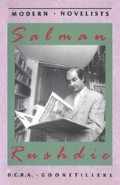Abstract
Rushdie was a writer without a subject. After attaching himself to a woman from his adopted country, Rushdie did what comes naturally: took her with him to visit the mother country (to celebrate the acceptance of Grimus for publication by Gollancz for ‘some paltry sum’1). There his subject, India, hit him on the nose, with an immediacy of impact, the sights, the smells, the scenes, especially Kashmir where he had holidayed as a child (this explains the luminous beauty with which he invests it in Midnight’s Children and Haroun), while Indian politics, Indira Gandhi’s state-of-emergency, aroused his indignation.
Preview
Unable to display preview. Download preview PDF.
Notes
Liz Calder’s words, quoted from Ian Hamilton, ‘The First Life of Salman Rushdie’, in The New Yorker, 25 Dec 1995 & 1 Jan 1996, p. 101.
Liz Calder’s words, quoted from ‘Salman Rushdie: Interview by Suzie MacKenzie’, in The Guardian Weekend, 4 November 1995, p. 15.
T. S. Eliot, ‘Yeats’ (1940), in On Poetry and Poets (London: Faber, 1971 edn), p. 252.
Rushdie interview in Scripsi, Vol.3, Pt 2–3, 1985, p. 114.
Kapil Kapoor & Ranga Kapoor, ‘Third World Poetics — The Indian Case’, in ACLALS Bulletin, 7th Series, No.5, 1986, p. 54.
Rushdie, ‘The Courier’, in East, West (London: Cape, 1994) p. 211.
Rushdie, ‘Imaginary Homelands’ (1982), in Imaginary Homelands: Essays in Criticism 1981–1991 (London & New Delhi: Granta & Penguin India, 1991), p. 15.
Rushdie, ‘Outside the Whale’ (1984), in Imaginary Homelands, p. 87.
Bryan Appleyard, ‘Portrait of the Novelist as a Hot Property’, in The Sunday Times Magazine, 11 September 1988, p. 31.
Salman Rushdie, Midnight’s Children (London: Picador, 1982 edn), p. 9;
Shashi Tharoor, The Great Indian Novel (New Delhi: Penguin, 1990 edn), p. 17.
David W. Price, ‘Salman Rushdie’s “Use and Abuse of History” in Midnight’s Children’, in ARIEL: A Review of International English Literature, Vol.25, No.2, 1994, p. 103.
Ernest Renan, ‘What is a Nation?’ (1882), in Nation and Narration, ed. Homi K. Bhabha (London & New York, Routledge, 1991 edn), p. 19.
Salman Rushdie, ‘Midnight’s Children and Shame’, in Kunapipi, Vol.7, No.1, 1985, p. 4.
Linda Hutcheon, The Politics of Postmodernism (London & New York: Routledge, 1993 edn), p. 1.
Robert Graves, Greek Myths (London: Penguin, 1969 edn), Vol.1, p. 175.
Salman Rushdie, ‘Midnight’s real children’, in The Guardian, 25 March 1988, p. 25.
Rushdie, The Wizard of Oz (London: British Film Institute, 1992), p. 33.
Winston S. Churchill, India: Speeches (London: 1931 edn), p. 94.
Robert Graves, The White Goddess (London: Faber, 1961 edn), p. 303.
Gunter Grass, The Tin Drum, trans. Ralph Manheim (London: Penguin, 1967 edn), pp. 385, 388.
Uma Parameswaran, ‘Salman Rushdie’, in Encyclopedia of Post-Colonial Literatures in English, ed. Eugene Benson & L. W. Conolly (London & New York: Routledge, 1994), p. 1390.
Timothy Brennan, Salman Rushdie and the Third World (New York: St Martin’s Press, 1989), pp. 103–4.
Gayatri C. Spivak, ‘Reading The Satanic Verses’, in Third Text, Vol. 11, 1990, p. 46.
see also Rushdie, ‘Minority Literatures in a Multi-Cultural Society’, in Displaced Persons, ed. Kirsten Hoist Petersen & Anna Rutherford (Denmark: Dangaroo Press, 1988), p. 35.
S. Nomanul Haq, ‘A Moslem tells Salman Rushdie he did wrong’, in The Rushdie File, ed. Lisa Appignanesi & Sara Maitland (London: Fourth Estate, 1989), p. 232.
Copyright information
© 1998 D. C. R. A. Goonetilleke
About this chapter
Cite this chapter
Goonetilleke, D.C.R.A. (1998). Midnight’s Children. In: Salman Rushdie. Macmillan Modern Novelists. Palgrave, London. https://doi.org/10.1007/978-1-349-26745-3_2
Download citation
DOI: https://doi.org/10.1007/978-1-349-26745-3_2
Publisher Name: Palgrave, London
Print ISBN: 978-0-333-63673-2
Online ISBN: 978-1-349-26745-3
eBook Packages: Palgrave Literature & Performing Arts CollectionLiterature, Cultural and Media Studies (R0)

